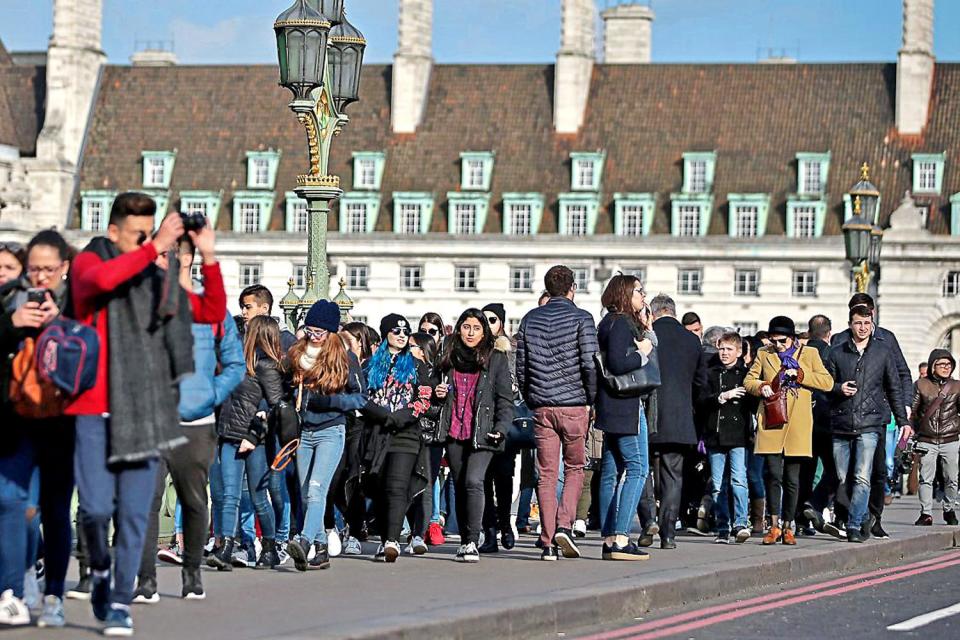Rashid Razaq: The horror of Westminster is over, and life is quickly returning to normal

Is she OK? My first thought was for my wife, who works inside Westminster. My second was that I can probably guess the motivation, if not background, of the attacker with depressing familiarity.
Islamist terrorism has become so frequent around the world as to have become routine. Yet there’s nothing like an attack on those you love or where you live to jolt you out of that complacency.
Personally, I don’t have much truck with people who try to draw an equivalence with a terror attack on a normally safe city with that on a normally unsafe city.
Their intention is usually to make you feel guilty for caring more about something closer to home than something that happened in a conflict zone or a troubled part of the world, as if there’s only a limited amount of pain and suffering to go around.
The very reason that millions of people visit the capital each year, and thousands choose to make it their new home, is because it is an incredibly safe city.
As well as Britons, the dead and injured included citizens of France, Romania, South Korea, Greece, Germany, Poland, Ireland, China, Italy and the US.
Take a pin and stick it on a map and you’d be just as likely to find someone from that part of the world walking on Westminster Bridge on Wednesday afternoon. And yet my first concern was for my wife, and then my friends, and then people I know, because that is human nature.
Politicians must speak words of defiance and carrying on as normal to give us the reassurance we need but it is not cowardly to be afraid.
Fear means we have something to lose. A man who takes a car and uses it to try to kill children and tourists before stabbing to death an unarmed officer clearly deems his own life to be so worthless that he is willing to stake it all on a potential reward in a hypothetical afterlife.
The fight against Islamist terrorism has been described as a generational struggle. It is coming up to 20 years now, and it’s hard to gauge how many generations we’re talking about.
The threat from Al Qaeda has morphed into something even nastier and more nihilistic in the form of Islamic State, but their goals have also become more concrete in the form of territorial power in Iraq and Syria.
And while the scale of 9/11 and 7/7 has been avoided, in large part due to the efforts of the police and intelligence services, the entry level for terrorism has been lowered to the ability to drive a car and obtain a knife.
It is impossible to mitigate against that type of threat, even if we wanted to live in a police state with unchecked surveillance powers.
The death of Martin McGuinness this week prompted tributes and criticism from people with differing views of the recent past. It’s also a reminder that absolute security has never truly existed, and of the timescales involved in defeating terrorism.
As a Muslim, my entire adult life has been, and will probably continue to be, defined by belonging to the most reviled and feared community in the Western world. I sincerely hope that’s not the case for my own children, that by the time they reach adulthood the threat has changed into something else, because some sort of threat will always exist in some form or another.
Proportionality of response remains the hardest thing to get right. How to improve security at one of the most heavily fortified buildings in the most heavily policed areas of London? A security review will rightly be carried out now but is it possible to make Westminster much safer than it is already? Is it desirable to make the seat of our democracy a no-go area for the public?
A specific threat based on credible intelligence — say the threat of explosives concealed in electronic devices — may justify banning passengers from taking laptops and tablets with them onto airplanes.
But a ban on people flying to countries because of where they come from, or their religion, appears to be a disproportionate response based on shoddy, if any, intelligence.
The relatives of those killed, and the people injured, in the attack may never fully recover from the atrocity. They deserve our sympathy and respect. For the rest of us the question is how we respond proportionately to what happened in Westminster on Wednesday.
My wife was OK. She was shaken and upset, understandably as she witnessed the death of PC Keith Palmer and the shooting of the man who allegedly killed him, from the window where she works.
As a journalist she had to write about what she saw, and then like millions of other Londoners she caught the Tube home, ate dinner, went to bed and got up the next morning to get on with her life.

 Yahoo News
Yahoo News 